But I’ll Never Forget The Way You Make Me Feel (5042)
Podcast: Play in new window | Download (Duration: 1:15:18 — 69.1MB)
Subscribe: Apple Podcasts | Spotify | iHeartRadio | Email | RSS | More
Music fuels a lot of episodes around here. Today’s show is no different. It was sparked by a song that Drew and Ellie Holcomb recorded on their last record, Dragons (August 2019). Track 3, “But I’ll Never Forget The Way You Make Me Feel.”
Drew and Ellie met in college. They’re both 37. They’ve been married for about 13 years. I don’t know much more than that, except what we can discern from the music they create together. I rather think that after 13 years they’re still in love with each other and their music. It’s a pretty sweet gig they’ve got going.
I’ve got my own sweet gig going. And today I’m going to tell you all about it. Okay, maybe I’m not going to tell you ALL about it, but I’m going to tell you enough about it to spark your own reflections into your own life. Especially the most important people in your life.
I intended this show – today’s show – to be something different. I even teased it over at the private Facebook group. Love, Laughter and Levity.
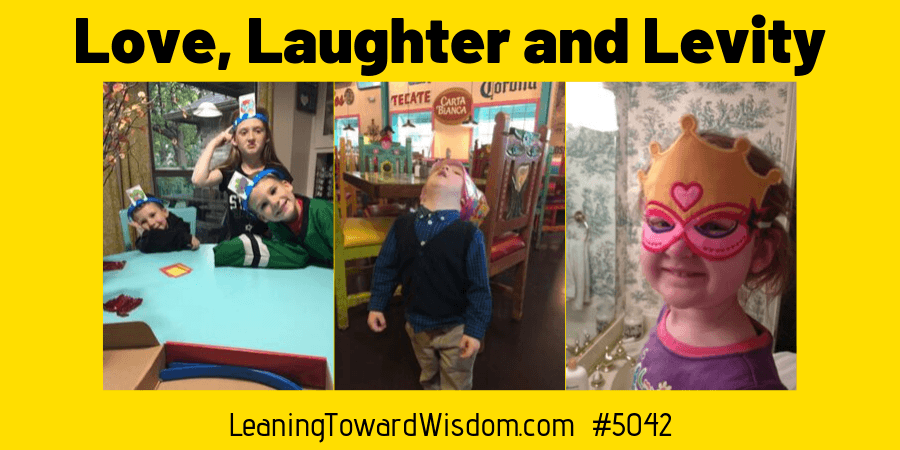
The more I worked on it the worse things got. I kept getting stuck. And it’s not because those topics don’t have a heavy influence in my life. I’m not really sure why it was so hard. I started noodling around with the last topic, levity. Maybe that was a poor strategy. It’s a pretty easy subject for me really because in spite of my sober demeanor I rather enjoy snarkiness, sarcasm, and levity. And I laugh pretty regularly.
I was walking, as I am wont to do in the wee hours and listening to tunes. At some point, I activated Drew Holcomb and the Neighbors latest record, Dragons. First up, a tune called, “Family.” It’s a short little lively song. 2 minutes 20 seconds.
It’s a great video featuring many of Nashville’s musicians and their family. Well, that’s all she wrote. I was stuck now on a different course for this episode. I instantly went to the first L word of the proposed title, LOVE.
I’m a hopeless romantic. And very sentimental. Always have been. There is no cure. Warning this episode is going to lean into all this so if that’s not your thing, I get it. It’s a shame ’cause you’re really missing out on some of life’s most terrific elements in my opinion. But that’s okay. If you want to hit STOP and catch the next episode, I’ll try to understand even though it won’t be easy! 😀
By the time track 3 launched into my earbuds, a song I’d listened to many, many times before…I was a mess. “But I’ll Never Forget The Way You Make Me Feel.”
Here’s a 37-year-old couple singing about growing old together. Him, unable to remember specific details perhaps, but always able to remember the way she makes him feel.
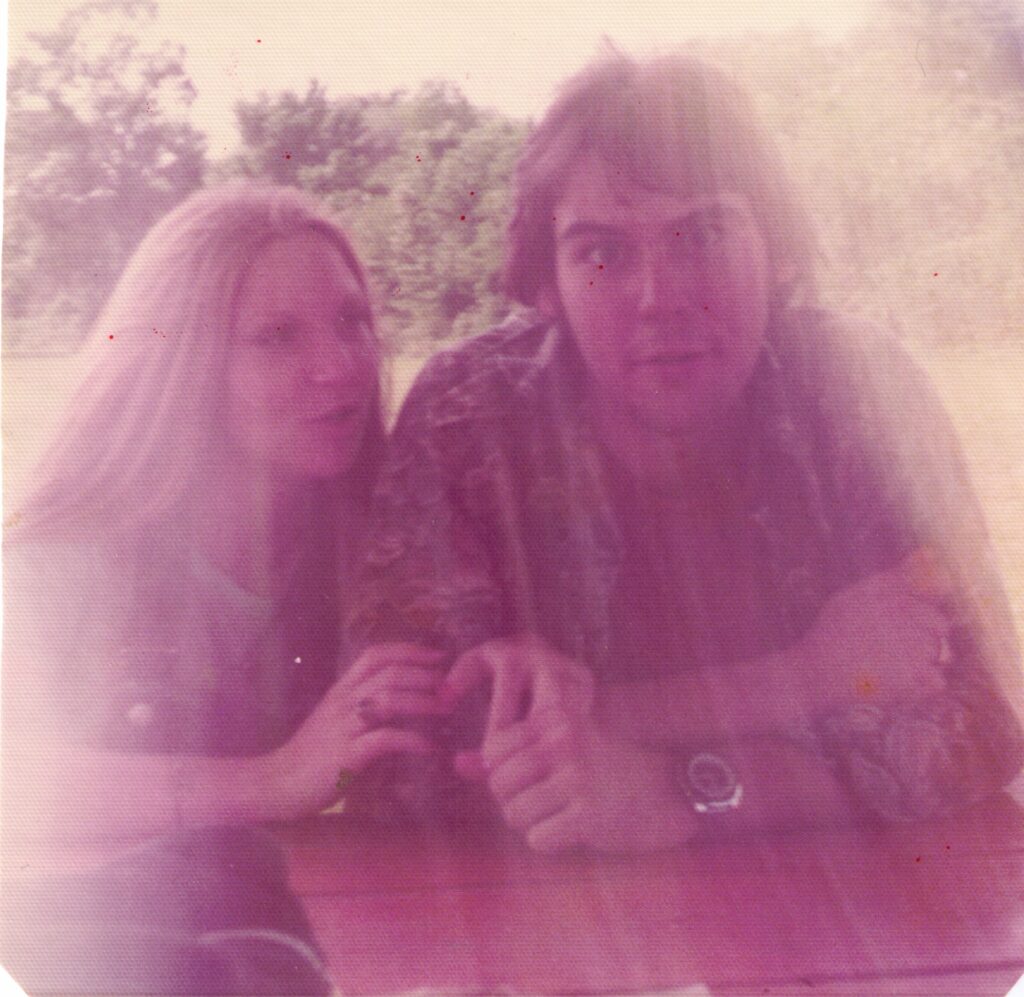 We’re 62 now. Me and Rhonda. We are growing older together. We’re pushing hard on entering year 42 of our marriage. Year 45 of being a couple. Being 17 or 18 and in love is pretty terrific. Being 62 and just as in love is even better.
We’re 62 now. Me and Rhonda. We are growing older together. We’re pushing hard on entering year 42 of our marriage. Year 45 of being a couple. Being 17 or 18 and in love is pretty terrific. Being 62 and just as in love is even better.
It was likely a Saturday, but I don’t remember that detail. Guess I’m a lot like Drew’s song. But that’s about the only thing I don’t remember. We were out at a park at the far end southern end of Highland Road in Baton Rouge. Flying kites. At the northern end of Highland Road is the entrance to LSU. I lived somewhere between LSU and the park off Highland Road. Rhonda had come down from Ft. Worth to visit. We were already a couple. I was mad about her and getting more so by the day.
Attending classes at LSU was drudgery except for handwriting daily letters to take by the Student Union to drop into the mail. And checking my mailbox daily for her letters. It was a habit we maintained for over 2 years. Such was life in the 70’s when you don’t have Internet, cell phones or social media.
The music that weekend was a heavy rotation of Poco’s album, Crazy Eyes. I was a bigtime Richie Furay fan, the leader of Poco. He had the talent to pull off a 10-minute title track song in what we then called progressive country music. My eyes were crazy for this Texas girl.
We’re at this park flying kites and I’m supposing my sister or somebody else is with us because this picture I’ve posted isn’t an old school selfie. It’s the old Kodak Instamatic camera I used. Very old school and as you can very low resolution. But I’m glad we had it or today we wouldn’t have any pictures. Kids today have no idea. They take being able to whip out their phone and take thousands of photos every month for granted. Not to mention how spectacularly detailed the photos are today. At the time I just felt lucky to have a camera that took a film cartridge, which meant I could pop in a cartridge with about 16 picture capacity and I didn’t have to spool the film through the camera, which is what you had to do with an SLR camera. I wasn’t rich enough to afford one of those. Besides, I wouldn’t have known how to work it. My camera was just a black box, point and shoot camera. Then you put the cartridge into an envelope, wrote your name on the outside, sealed it and gave it to the person at the counter of the drug store where they shipped it off somewhere to be developed. Within a week or so you had hard copies of your photos. And you usually got a second set of prints at no charge. Such a deal!
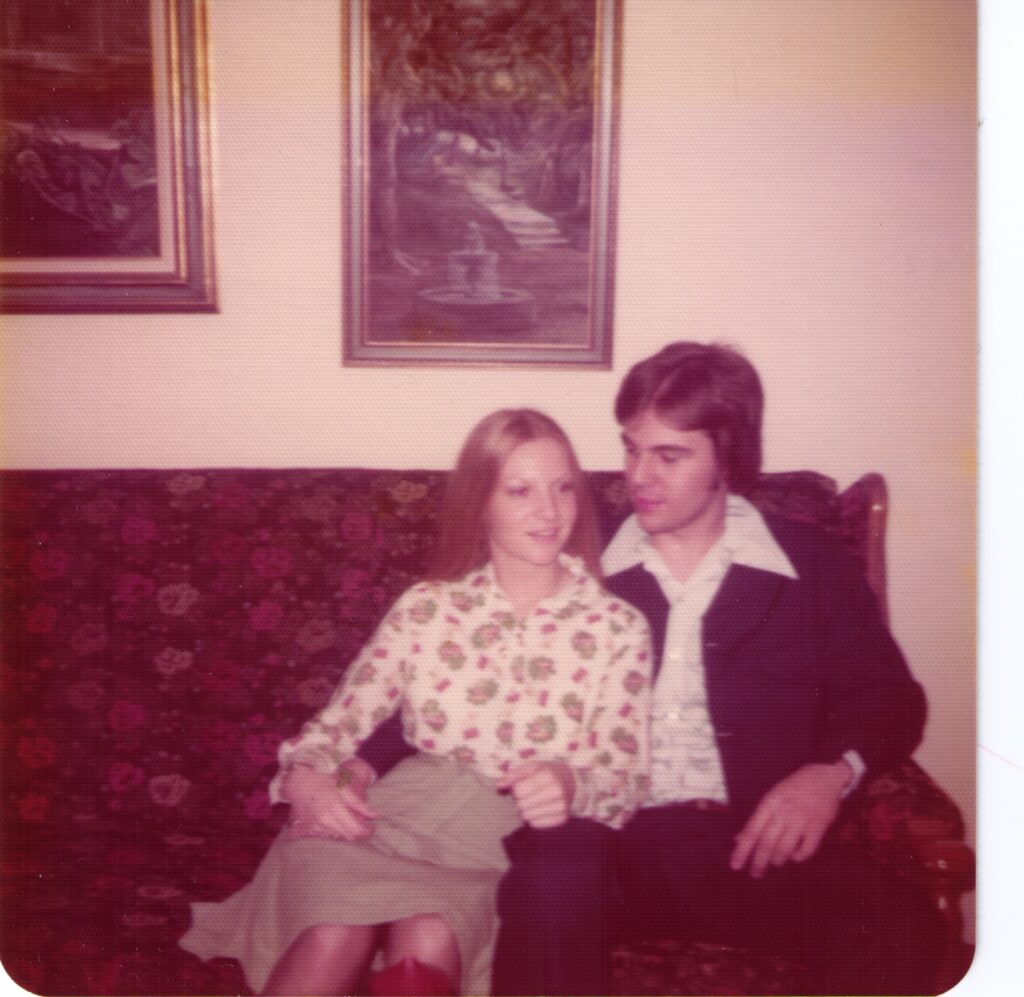
Nobody had to tell me to wear a collared shirt in the 1970s. 😀 Look at that hideous monster of a collar worn under that polyester leisure suit. I don’t know if I’m more ashamed of the outfit or my hair. Or those sideburns. It’s all atrocious. But look at that gorgeous girl under my arm. Are you gonna question her taste? Well, okay, maybe. But you can’t question my taste. Not when it came to her. So what if I wasn’t able to stylishly clothe myself? Or find a barber capable of trimming those sideburns? I had found a girl in Texas, put my arms around her and I was NOT going to let her go.
Well, the way she makes me feel started on July 2, 1975. Our first date. I won’t get all mushy and tell you how stupidly, head over heels in love I was, but I was. By January 2, 1978 we were walking down the aisle. If you think this garb was embarrassing then you’ve not seen our wedding photos where I was attired in a white tux looking like a big polar bear with a mustache. And you didn’t think I could top this leisure suit look! You idiot…my lack of style knows no bounds.
But I could look half-way decent. Even moderately cool. Even if it was in a plaid shirt with an over-sized collar. Here’s proof. Me outside of Rhonda’s house in Ft. Worth with car keys in hand. I’m likely about to head out and begin my 11-hour trek back to Baton Rouge. There was only four-lane Interstate between DFW and Shreveport. After that, it was mostly 2 lane highway dodging sugar cane wagons. Don’t let my slight smile fool you. I was dying inside knowing I’d have to spend a full day driving home alone leaving my heart and most everything I cared about right there on Nancy Lane.
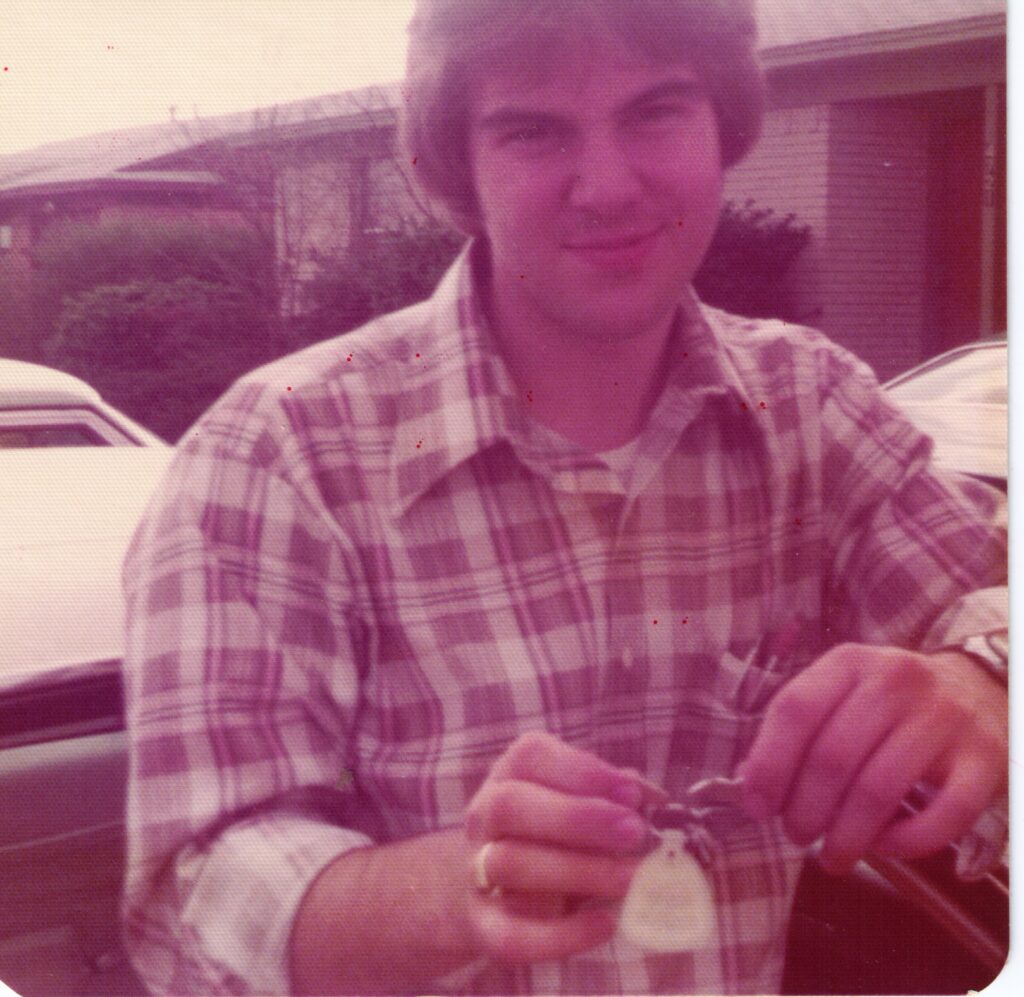
I kept a journal log in my car where I tracked all my gasoline fill-ups and my mileage. So I’m sure I knew how many trips I made to see her, but I’ve long forgotten it by now. I can tell you this – it wasn’t nearly enough to suit me. And we’re talking about taking off work when the stereo store closed Friday evening – after begging the boss to let me off on a SATURDAY! Retail’s biggest day. I’d blitz out around 7pm and pull onto Nancy Lane where Rhonda lived around 6am Saturday morning. Thus would begin a 30-hour-weekend together before I had to load into Sundance, my 1972 Pontiac “hot rod,” and hoof it back to Red Stick. Here’s another pic of a good-bye – us standing beside Sundance and me not wanting to let her go. Those trips back home sucked. 😉 I was saved only by playing loud music all the way home!
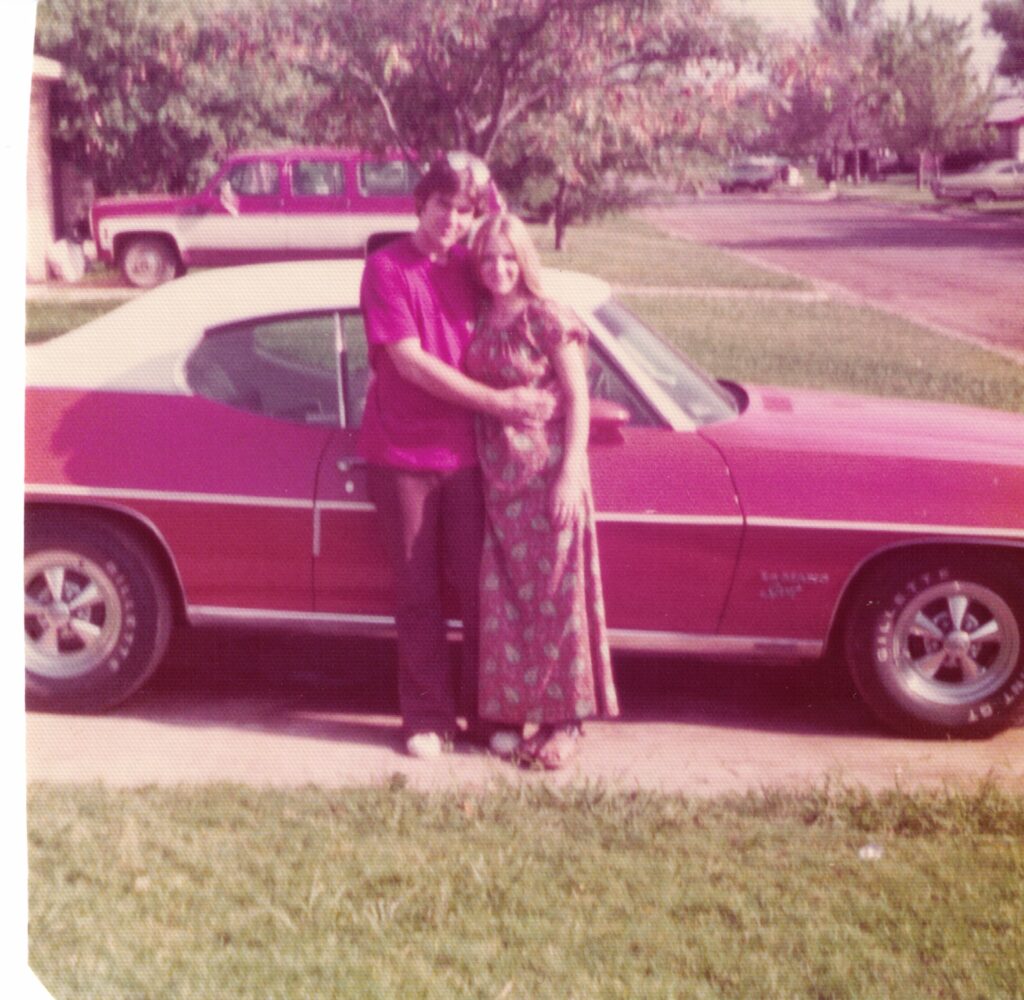
This went on for over 2 years. All the while my life was in turmoil at home because I hated school, had no idea what I wanted to do with my life and the girl I loved was 11 hours away. Nothing would turn around until we got married because then I jumped into journalism school where I fell into what I felt I was meant to do. Write. Create. Fulfill curiosity. Communicate.
Selling stereo gear, too. Well, selling it was mostly listening to music to show it off. I loved that, too.
We’re now 3 years or so down the line from that first date. It’s been an arduous 3 years. A lot has changed. A lot had changed in me.
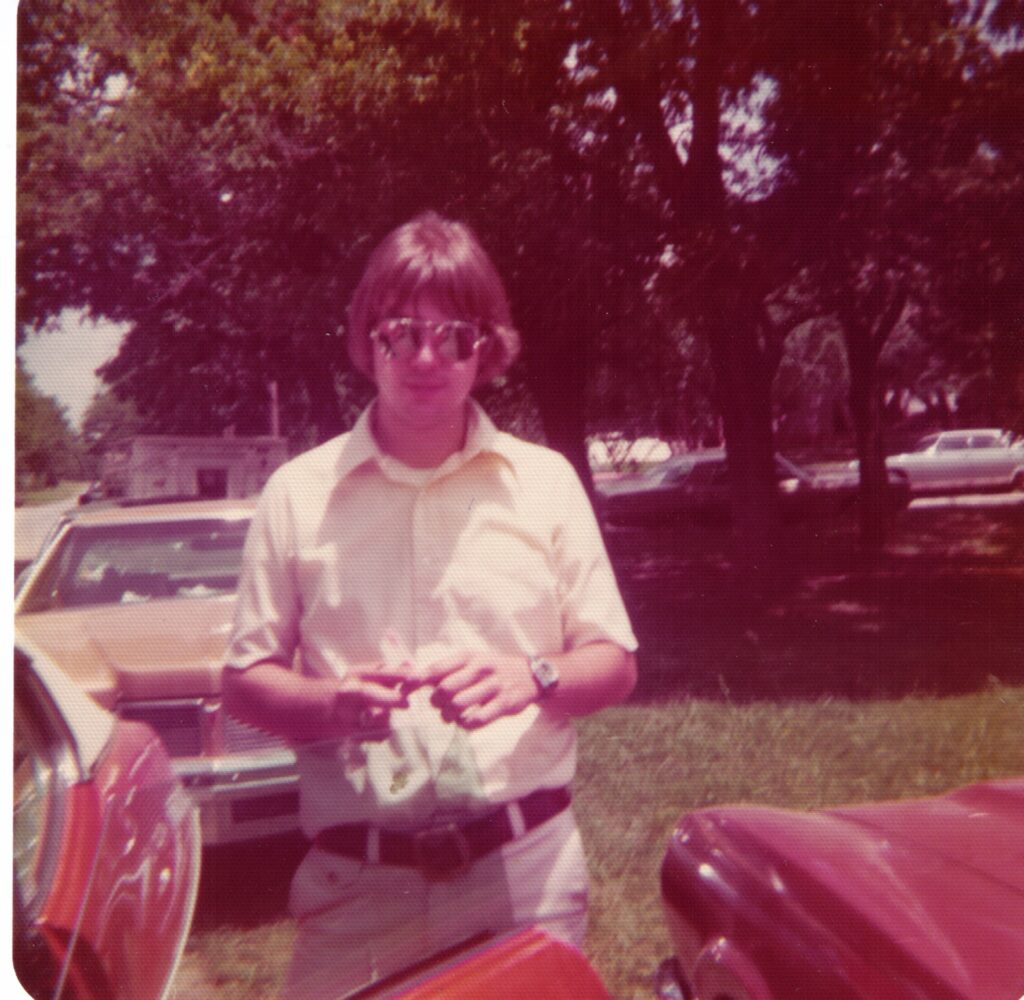
Oh, this picture of me taken the week of our first date shows that I was quite cool, hip and handsome – none of that changed, of course! But most everything else had changed. All because this girl from Ft. Worth was making me feel different than I’d ever felt before.
Over the year I’d lose the hair and the mirrored sunglasses, but not much else. 😀
Okay, I’d lose a lot more. Or gain a bit. Come to think of it I lost and gained at the same time over the years. Stop laughing, you’re doing it too!
Let’s go back to the Drew and Ellie tune that prompted today’s show and even serves as the title. It’s early in the morning, the song is playing in my earbuds and I start to cry. I admit it. I was crying. And not just barely. Largely. Not quite weeping, but close.
I keep walking and listening. The song ends. The next song starts to play and I hit STOP. I don’t want to listen to it. I go back and listen to this song again. I’m embracing this weepy moment. It ends and now I’m ready for silence.
I keep walking.
Now I’m trying to figure out what I’m feeling. It’s a symphony of feelings. Grateful. Thankful. Happy. Sad. In love. Remembering. I’m thinking of these Kodak moments. I’m thinking of all the moments not captured. Mostly, I’m thinking of how I need to do more. Be more. For her. I’m wondering if I’ve given her a life she wanted. A life she expected when she first said, “Yes” to being asked out on a date. I’m wondering in this moment if she has regrets. If she feels like she got it right by agreeing to be my side all these years.
Me? I know I got it right and life has been largely not what I had ever planned. But mostly things had worked out. Some things have gone very wrong, but most things have gone very right. There’s only one major thing that went wrong and it’s enormous, but not suitable to talk about. Except to let you know our lives are very imperfect. We’ve suffered heartbreak and sorrow. But there’s one important detail you should know – mostly our heartbreak and sorrow haven’t come at our own hands. That is, we’ve not intentionally hurt each other.
I keep walking. I keep thinking. Trying to figure out why this flood of emotions is happening.
I’m sad and happy at the same time. Sad that so many years have passed and happy to have experienced so many. I’m thinking of Drew and Ellie, 37-years-old. 13 years into their marriage. I’m remembering our life together and I’m thinking of those first years in married housing at LSU. Life inside 540 square feet. I’m thinking of riding my bike to classes and all over the campus before heading to work in the afternoons. I’m remembering our joint cleaning efforts of our little apartment every Saturday morning. I’m thinking of how two kids, married and in love, can feel so free inside such a small space. Mostly, I’m thinking of how terrific that space was and wondering if I’ve ever been as happy. When life was simple. And most of our existence was the campus of a major university. I had gone from loathing the place to loving the place. All because that girl in the pictures made me feel very differently about it all. And about my life!
Then it happened again. Just as I’m getting my emotions under control I lose them again. I’m thinking, “Where did the time go?” Mostly I’m feeling I didn’t seize every moment as I should have. Nobody does. It’s impossible. Life would be precarious if we could. Life has to be routine or we’d all go crazy. But I’m regretting the ordinariness of it. I’m regretting that sanity demands habit and routine. I’m wishing life could be – could have been – as adventurous as those early years.
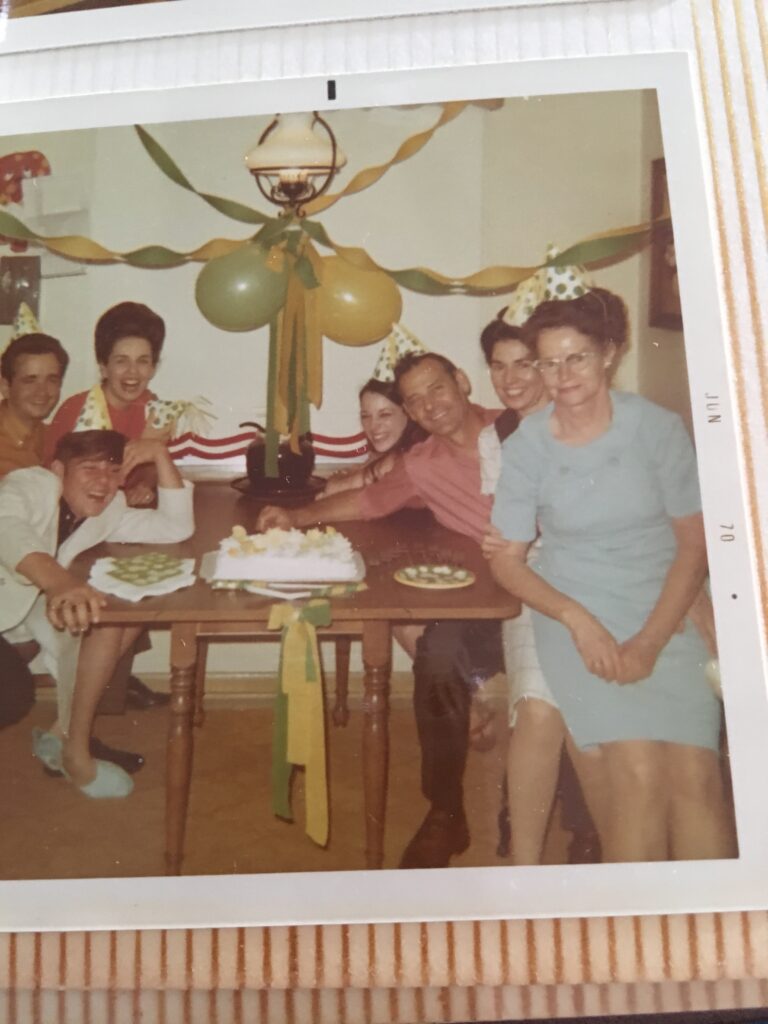
As the walk continues and I feel like I’m settling down emotionally I settle into the practical reality that life is largely routine. In fact, I gave a sermon at church Wednesday night about Samson. For some reason, I was inspired to mention how my maternal grandmother – Marie – behaved with tremendous predictability. We all, including me, called her “Re” (that’s her in the pale blue dress in the picture above; that’s me in the white jacket on the other side of the table). Her life was extremely routine but in all the best ways. She tended to folks, cooked and baked for folks and was pretty much a woman of service her entire life. It’s just who she was and what she did. Every day. Nothing amazing. Nothing award-winning. Nothing the world would describe as grand achievement. But to the lives she touched, she made a difference. My point, in my sermon, was that her daily routine was a dedication to righteous, spiritual pursuits. Samson was daily pursuing selfishness. Our lives are largely defined by the ordinary, daily pursuits of our life. Our routine.
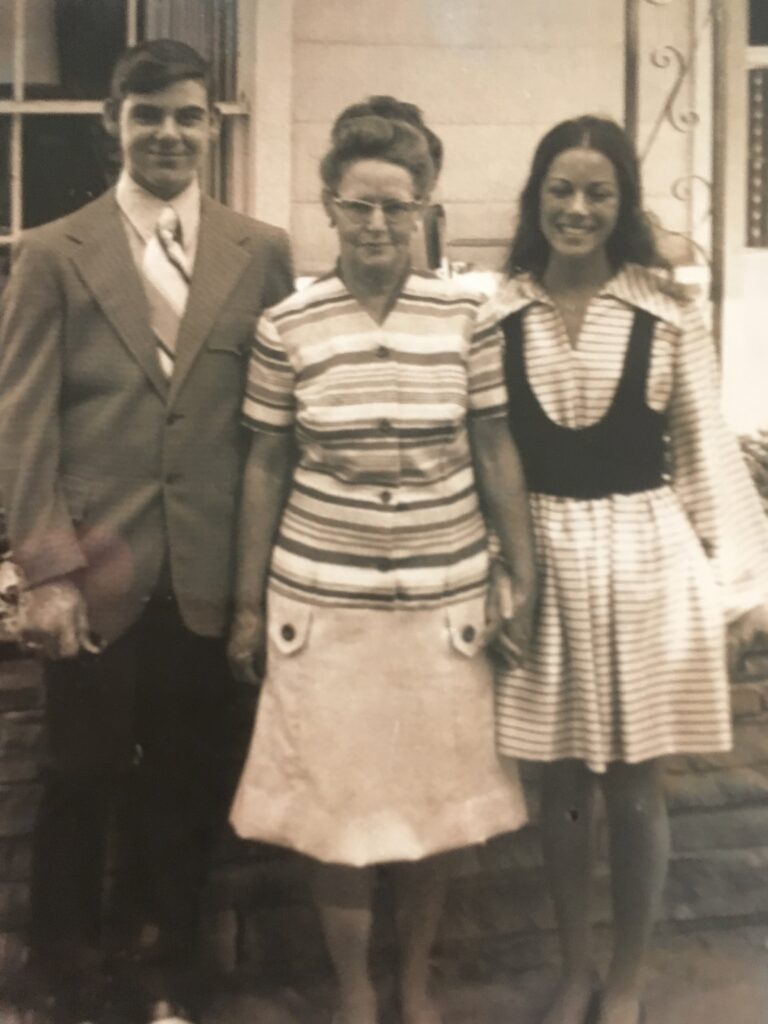
I’m not regretting the routine so much as I’m now thinking about how I may be able to improve engineering something more. If only now and again. Adventure is the word I keep dwelling on. But simplicity is the other word that’s dominating my thoughts. And my feelings.
Rhonda has a sewing room. Coupled with my Yellow Studio the two rooms are almost as large as our entire first apartment – that 540 square foot apartment at LSU. But man was it terrific. Cozy. Not cramped. Unfancy, simple and perfect in many ways. Okay, the washer and dryer in the bathroom were less than ideal. And the kitchen had a pretty rinky-dink refrigerator and stove. But I’d go back in a heartbeat. And likely find that my memories are more sentimental than reality. But I don’t think so.
The moon is not nearly as high in the sky as it was just a few weeks ago. I used to be able to walk in the wee hours of the morning and the moon would be almost directly overhead. When it was full, the light would be bright enough to easily see where you’re going. But now, it’s darker. The moon isn’t full tonight and if overhead is 12 o’clock in the sky, tonight…the moon is sitting around 10 o’clock. But directly overhead is The Big Dipper. Even here in a suburban neighborhood it’s easy to see.
I stare at the sky and keep walking. It’s quiet. I remove my earbuds to hear only the sound of my own steps. No traffic. No dogs barking. Some birds are out roaming the ground for food. I’m guessing insects, but what do I know? Not nearly enough…about birds anyway.
I’m thinking of the Yellow Studio and all my books, CD’s and stuff. Rhonda has been looking for some sewing patterns for 2 days. She can’t remember where she put them. It’s been driving her crazy. We both acknowledge that we’ve got so much stuff…we can’t keep up with it. It wasn’t always that way.
From LSU we bought our first little house. And life really got good. I missed the campus, but we had our own 2 bedroom place now with a full kitchen and felt like we now had a mansion. And Zeke, our first pet – a black Lab – joined us in a big back yard with BIG trees. The house was just a simple frame house, but it may as well have been a multi-million dollar estate for us. We had a new maroon Toyota Corolla hatchback named Roony. Monthly cost, $122. And our new mortgage was $222. We both worked and went to school. It may have been the financial zenith of our life. 😉 Not that our income was at a zenith, but our cost containment sure was. Yet, we had anything we wanted. Not too tough since we’re both practical people who have never been impulsive with money.
There was one major element of our life that wasn’t so terrific. Some won’t likely understand it, and that’s okay. But spiritually – that is, our church life – wasn’t very good. We knew we needed to elevate that part of our life and for us, that meant we needed to move. NO small thing since it meant leaving school. Rhonda is smarter than me. Certainly a better student. She was accustomed to making all A’s. Top scores. Until I got into journalism school my college career was marred with mediocrity. I had been a good student all through public school, but frankly, I hadn’t learned how to really study. At least not a subject I really didn’t care about. I was a great listener and note-taker. That worked for me all through public school. It stopped working when I got to LSU and discovered that self-study was mostly required. Cutting lots of classes didn’t help matters.
Once I entered the College of Journalism my grades shot up to the top across the board. I was into it. My interest and curiosity drove me to excel. But…
I knew I was never going to enter the world of professional journalism. I didn’t know how the skills would help me, but they did. In business. In life. The problem, at the time of our dilemma, was that I was closing in on my degree. I was about 18 hours shy of graduation when we moved out of town.
Was it a regret? Yes and no. Leaving town for the reasons we did? No. Not earning my degree? Yes. Rhonda not earning her degree? Even more so. She’s so smart she deserved to earn it. More so than me.
We had no way of knowing at the time, but it had absolutely no impact on my career. Well, to be fair — how can you ever know? That’s the thing about decisions. You only know the outcome of the choices you made. You never really know the outcomes of those other options – the paths you didn’t take. You can speculate all day long, but you just don’t know. I never cared about not having it until the last few years. Likely just the result of growing older and wishing we both had achieved something we were plenty sharp enough to achieve. Crying and spilled milk leaps to my mind.
By now the sky is still dark. I’m still walking. Listening to the sounds of the city come alive. The sounds of traffic in the distance are picking up, but it’s still very quiet. I click PLAY and listen to the song a 4th or 5th time.
“But I’ll never forget the way you make me feel.”
Now I’m wondering how I’ve made her feel. Have I made her feel as good about her life choices as she’s made me feel? I hope so. But as I walk I wonder.
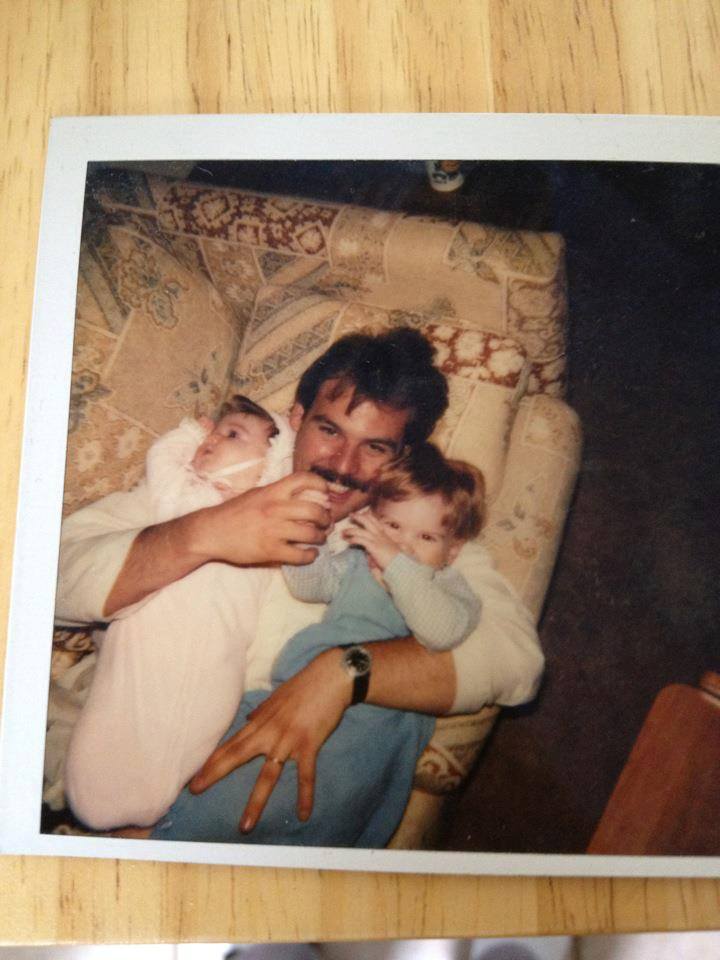
Fast forward our lives and by the time we’re 25 we’ve been married slightly more than 4 years. Our son was born when we were 23. The daughter, who bore a middle name of the grandmother I loved so much – Marie – came quickly after. We were having to figure things out very quickly, but we were at long last where we knew we needed to be spiritually. We were in Edmond, Oklahoma where an older preacher whom I had great respect for lived. Church was always the priority for us. And our family. Rhonda and I had met at church. We shared the Faith. We shared in our devotion to the Faith. We were raising and training our children in the Faith. That’s what took us to the OKC area, specifically Edmond.
Being part of a congregation was important to us. I was always active in church work having delivered my first “talk” (not sure how much of a sermon it was) when I was 11. I never aspired to be an evangelist, but I wanted to be the most competent congregational teacher possible – a public teacher delivering sermons in a local congregation. An elderly evangelist was in Edmond and I began to study with him weekly.
Eventually, my career took a solid turn for the better, too. I was running a retail company. Still in consumer electronics.
And we were both burning the candle at both ends. I was working about 80 hours a week and spending significant time in church work, preaching about four times each month while studying with my mentor. Rhonda had her hands full with two toddlers and her own work. I don’t know how either of us did it, but we did. When you’re young you have no idea what’s possible or what’s impossible. You just do what you have to do. Well, come to think of it – nothing changes much when you’re older. 😉
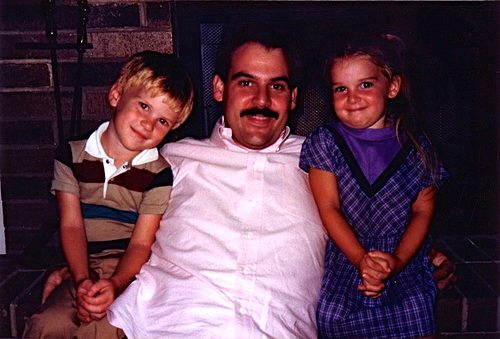
Fast forward past some very tough times. Some very good times. Some ordinary times. Much like your life. And everybody else’s. Life happened. We made the most of it mostly. At other times we struggled to figure out what was happening. Unable to make the most of anything because we felt like we were fighting just to remain alive. But we did survive. Life gave us lines, wrinkles, blemishes, and bruises. The other day I picked up two grandsons from school and Jake, the 10-year-old was showing some scar. I said, “I’ve got a million of them.” I only showed him three – all created from orthopedic surgeries. Most of mine aren’t made by a surgeon though. And they’re not all visible, or physical.
I’m meandering my way back home. I’m thinking of what we’ve accomplished together. I’m thinking of the millions and millions of dollars I’ve managed through the years of running businesses. I’m thinking of the doctors and surgeons she’s served. I’m thinking of our church work and the people we’ve tried to influence for good. I’m thinking of Re and all that she missed. I’m thinking of Rhonda’s mom who died shortly after we were married. She was only 43. I’m thinking of all she missed. I’m thinking of all our stuff – the physical things that at some point seem important. Even urgent. I’m back inside that little apartment at LSU. I’m thinking of how all our possessions would fit in one of the smallest Uhaul trucks you could rent. And how happy I was. How happy we were. And I keep thinking and walking.
In spite of the heartbreaks and sorrows, it’s still impossible for me to forget the way she makes me feel.
With all the joys, laughter and victories, it’s still impossible for me to forget the way she makes me feel.
I know our lives are horribly imperfect. I also know I’ve let her down more times than I can count. Not because I planned it or intended it, but because I’m often lame like that. I’m remembering the promises I made when we were young. Promises I’ve tried to keep, but in youthful exuberance didn’t realize some would be impossible for me. She made me feel confident though. So confident I thought I could give her the world. Time proved me wrong. Overly confident.
Part of me is wishing I could have just an hour with my future self 45 years ago. Then I smile, realizing an hour wouldn’t be anywhere near enough time. My smile widens as I realize my future self would have likely scared me, making me fearful of even going outside. And the result would have been no adventure. No drama. Just blandness. And neither of us signed up for that.
I’m resolved to fix some things. Work on myself more deeply. Work on making her life better in any ways I can. I don’t fully know how – not at this hour – but I’m confident I’ll figure it out. I’m a smart guy even if I am 18 hours shy of a degree. 😉
I’m over an hour into the walk. I know my body needs rest, but my mind won’t permit it. Not now. Not with these new preoccupations about the girl from Ft. Worth.
Jake, that same 10-year-old grandson, and I were watching a Charlie Brown cartoon on TV after school the other day. Charlie Brown was smitten by the “little red-headed girl” and was too embarrassed to even speak with her. I had found my little-blondish-red-headed girl, had the courage to ask her out and here we are four decades down the road together. As I head toward home, walking in the dark with only the moonlight, starlight and illumination of my iPhone I realize there are many things about life I’d love to improve. Burdens I’d love to remove for her. Burdens I wish she could remove for me. But I’m heading home knowing that we may never be free from worries, burdens, and failures. I just know the girl grabbing my arm sometimes still grabs my arm. And just like I did when I was a teenager, I’m holding onto her for dear life. Because that’s what it is. A dear – a very dear – life. Because I’m never going to forget the way she makes me feel.


Project #CravingEncouragement – Dave Jackson
The maiden voyage of this project kicks off with a good friend, a long-time supporter of Leaning Toward Wisdom, Dave Jackson. Dave is a professional podcast coach who helps people launch and grow their podcast.
Dave’s main website is at the School of Podcasting
He and Jim Collison also co-host a live-streaming and podcast show at Ask The Podcast Coach
Thanks for the support and the stories, Dave!
Randy
But I’ll Never Forget The Way You Make Me Feel (5042) Read More »
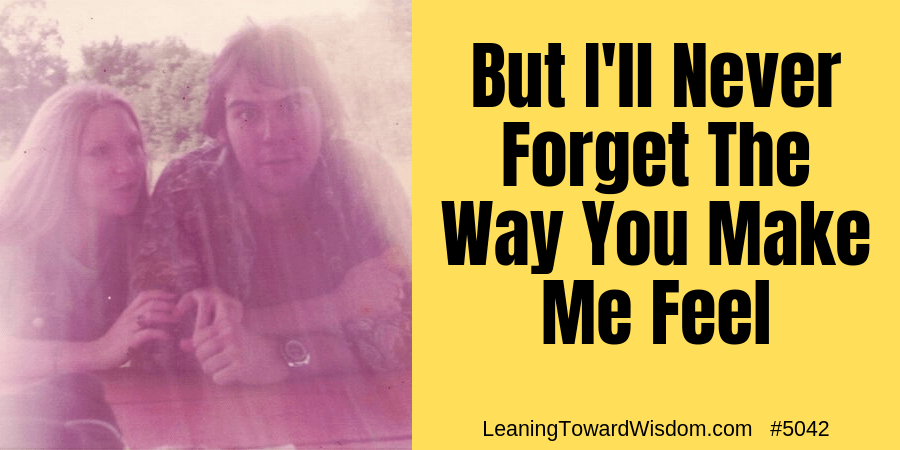

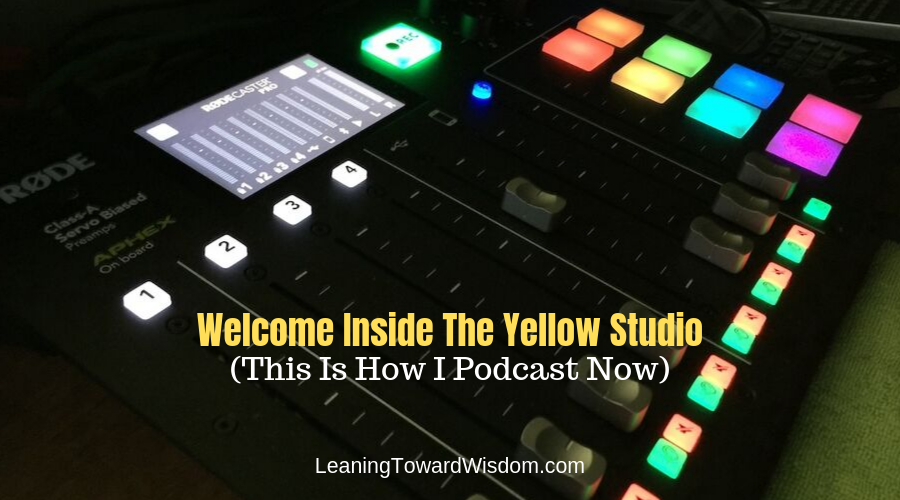
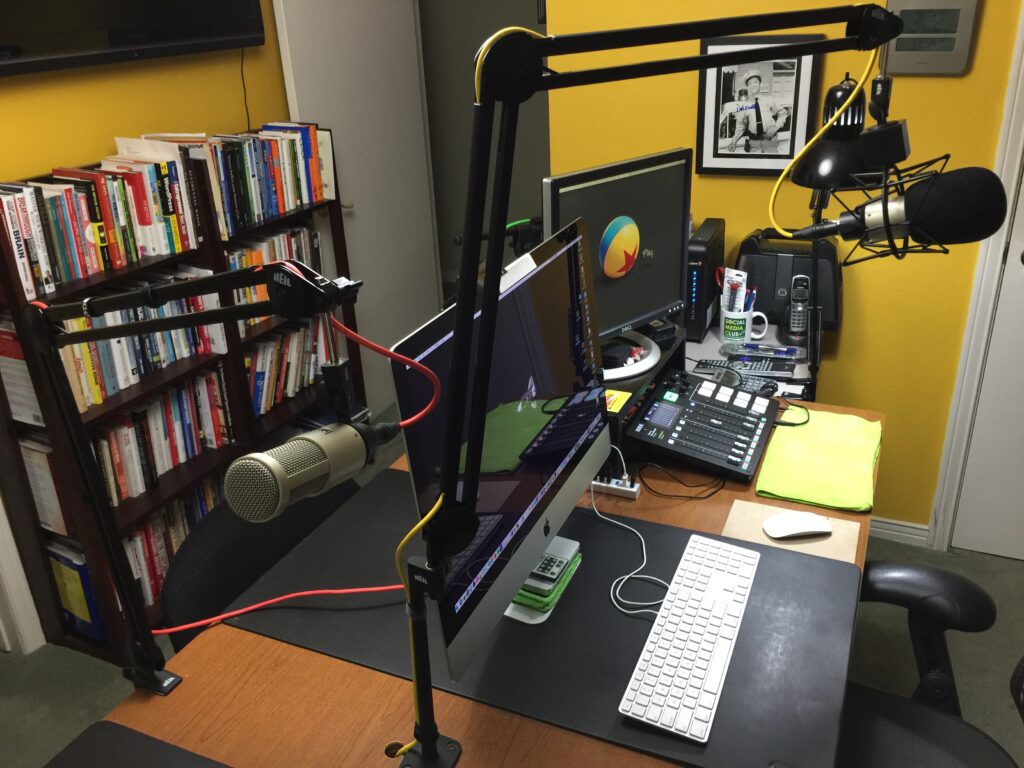
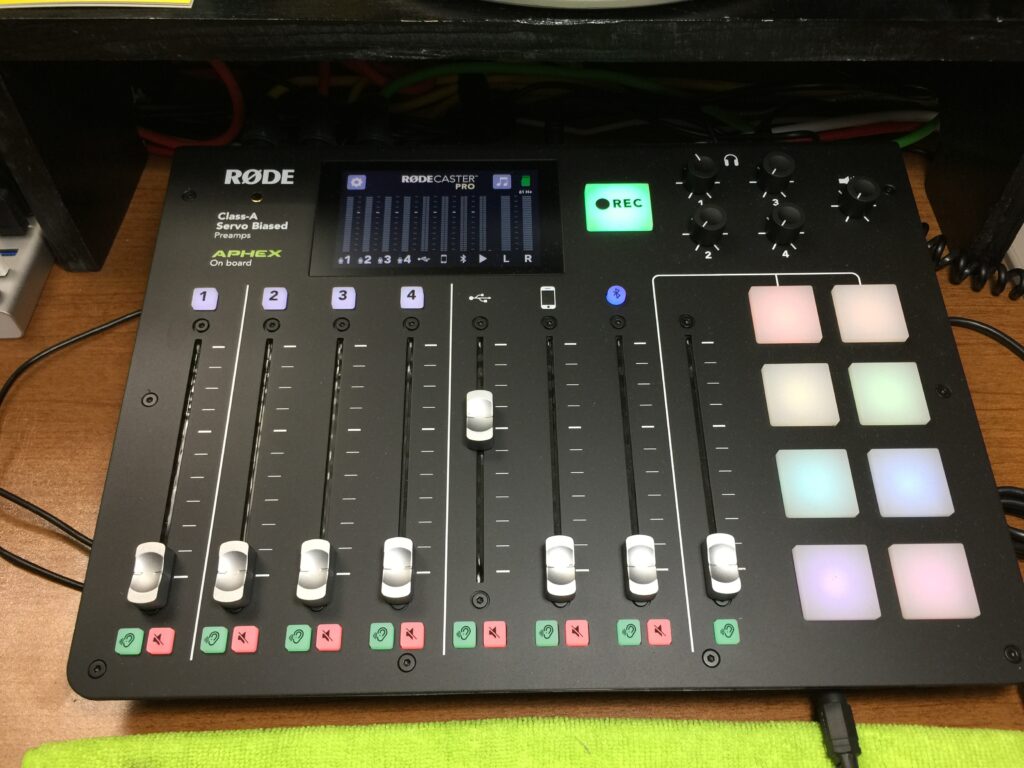
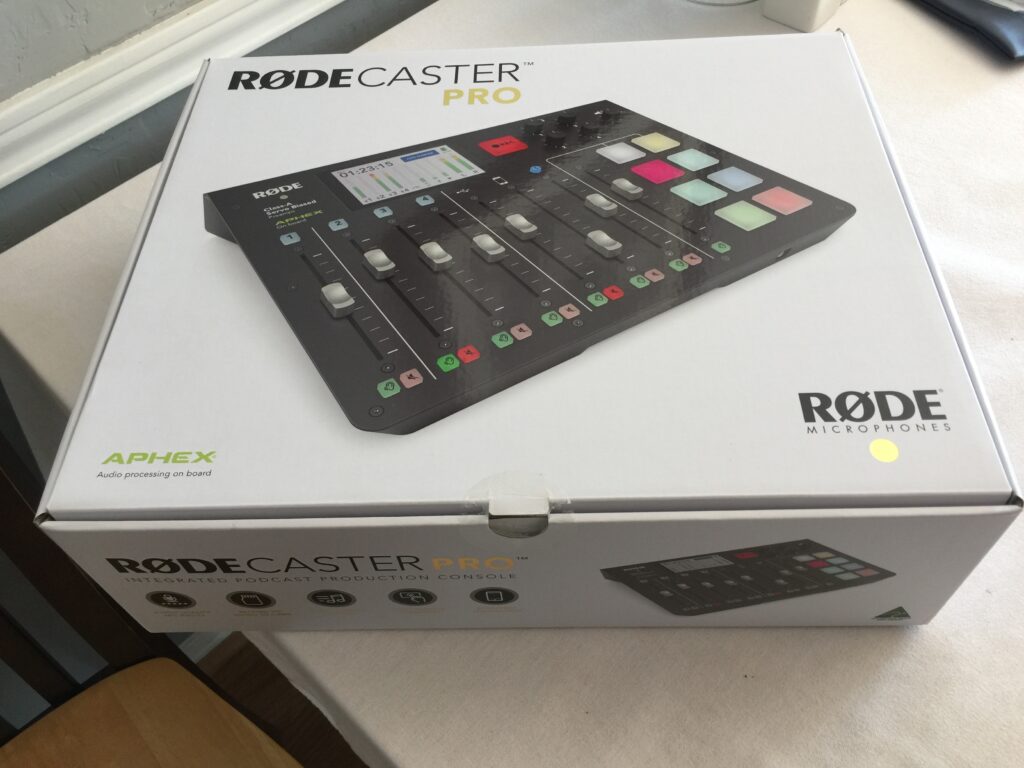
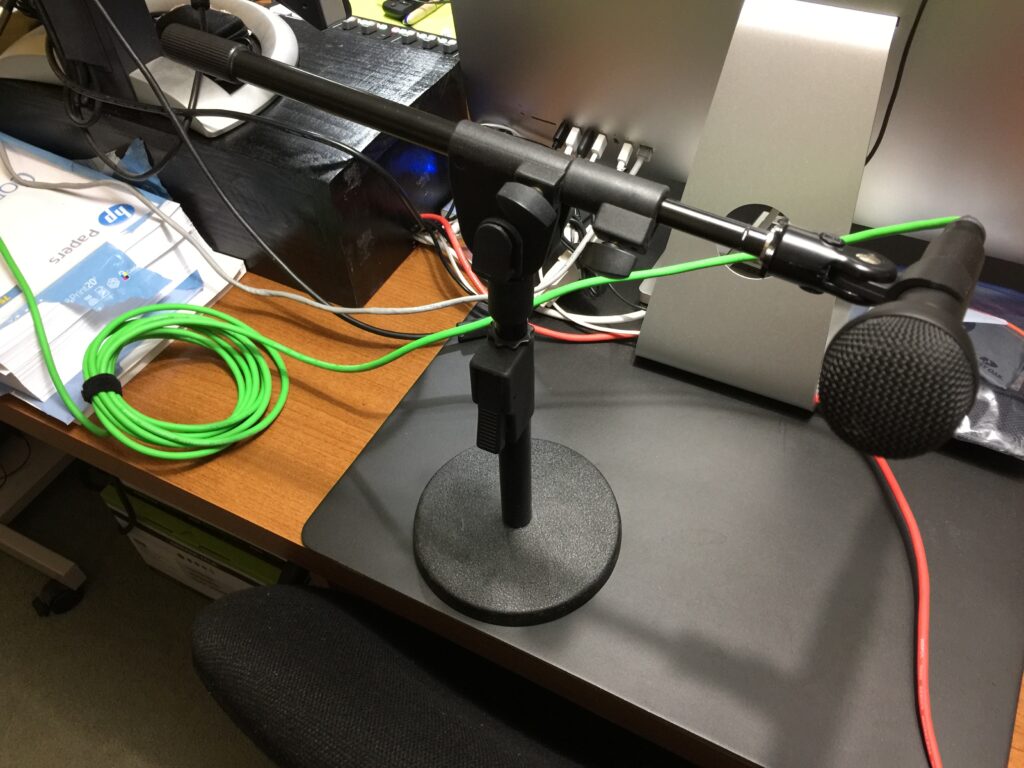

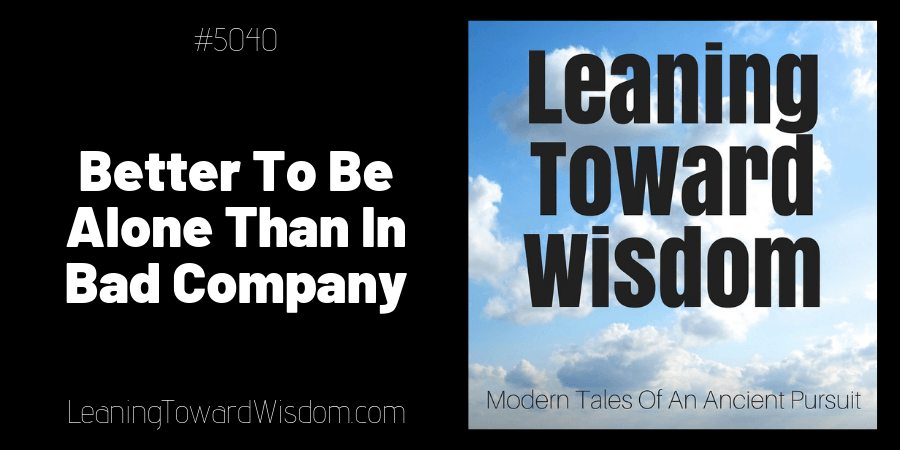

 Visit
Visit